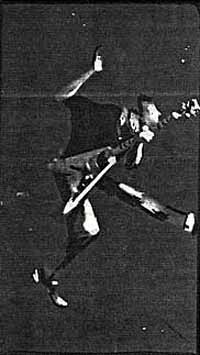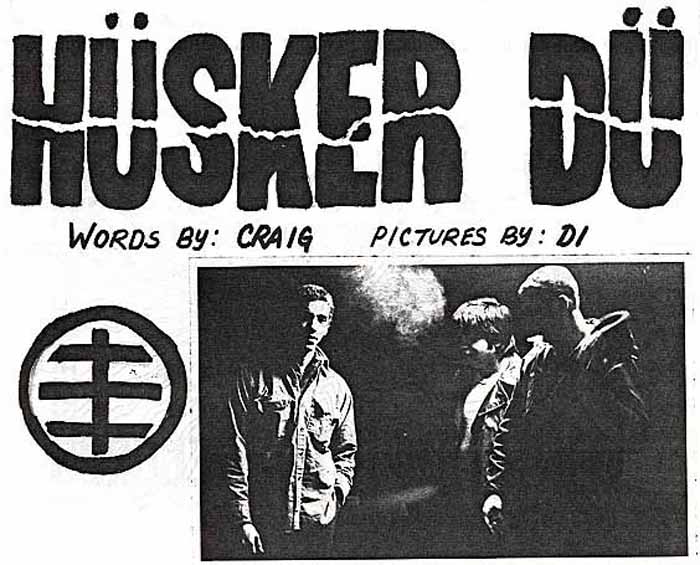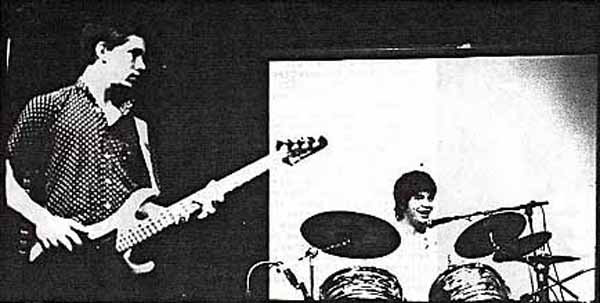miss proposition with mixdown; you really
had to be on top of it. It turned out good.
Side two is stronger material and it is a
little more uptempo (laughs) than the first
side.
C.R.: When did you guys form?
Bob: May* 1979. No real bands had ever really
played out around that time.
Grant: Me and Greg worked together at a record
store and Bob was a customer.
Bob: The scene was just going down for the first
time.
Greg: It was right after when the Suicide Commandos
busted up, and everybody just started to get
this attitude that "Now this scene is dead;
the Suicide Commandos started it, and now
they've finished it." But it wasn't true:
they just paved the way for all the other
bands.
Bob: Yeah, and at that time the Suburbs started
playing more danceable music.
C.R.: How about Twin/Tone Records?
Bob: Yeah, it's a good label, and it really takes
care of its people. Almost too much--
overprotection--but they sell their bands
like crazy. They force it on people.
C.R.: Is this album going to be a one-off with New
Alliance?
Greg: It's hard to say. I'd like to continue, but
it's a wait-and-see situation. But they are
easy to work with.
Grant: The first pressing is already sold out. The
first thousand are gone in four days.
C.R.: Did you expect that?
Grant: Yeah. After three years of busting our
asses, something had better have happened.
C.R.: Do you play a lot in the Midwest?
Bob: We just played in Madison, in the student
union. Everything was trashed.
Grant: The place looked like the grand ballroom from
Camelot: it's got these 14th century
tapestries on the wall, the flags of all the
nations, murals on the ceilings, silk drapes.
And it was all totally destroyed. It was
about $500 worth of damage** to furniture,
etc...
Bob: So they had to call the cops and everything.
C.R.: Did you have to pay any of the out-of-pocket
expenses for this damage?
Greg: No, we didn't; but unfortunately, the guy who
put it together got the bill.
Bob: But he didn't pay it, and he's not going to
pay it.
C.R.: What's going to be your followup to the album?
Bob: We're going to follow it up with a 7" single,
recorded in a studio. We'll try to do it with
New Alliance if we can; if not, we'll do it
ourselves, limited edition. SST might want to
do the single. Then we'll do a short Midwest
tour in March. Then we do more recording on
the West Coast.
C.R.: How did you get to the point where all three
of you sing?
Bob: Well, we all three write, so...the writer
generally sings the song.
Greg: Yeah, we sort of have this policy: "You write
it, you sing it."
Grant: Now I got started singing before I saw a lot
of bands live, so I got used to doing it before
I realized it wasn't the sort of thing you do.
Breathing is the hardest part; sitting is
really hard on the diaphragm.
C.R.: Who are your favorite bands?
|
Greg: Having played with the Dead Kennedys and Black
Flag, I have to say that I like them a lot.
Biafra is an excellent frontman and he knows
how to put on a great show. Henry really adds
a lot to Black Flag. I've worked in record
stores for [a long time(?)], and when I was
laid off I just sort of let my ears rest. Plus
being unemployed for the last year: no money--
no records. But basically my tastes don't run
that much to hardcore, but more to experimental.
Bob: Man Sized Action and the Blue Hippos are good
in Minneapolis.
Grant: Being in clubs most of the time, I'm overexposed
to the new stuff so when I'm at home, I listen
to a lot of instrumentals. I like most of the
really high treble guitar. I like really well-
done production. But right now my fave is a
polka song by Little Joe's Dance Band, but it
has a really exciting, excellent sound to it:
bum-bump, bum-bump, dum-ba, dum-ba-da.
Discharge, right?
Bob: The stuff I like is funny, 'cause when we
started out there wasn't any hardcore at all,
but now there are all these bands that are
doing very similar things without ever having
heard one another. I'm really curious to hear
what our contemporaries sound like-- Necros, DC
bands, the LA stuff. I mean, you don't know who
these people are, and when they come up with
the same licks. Also I like 60s pop and some
experimental stuff.
C.R.: Do you do any cover songs?
Grant: We'll do them, but for fun only.
Bob: We just added "Sunshine Superman" to our set
(laughs).
C.R.: Is there any reason why you play a Flying V?
Bob: Not really. That's the only thing I could get.
At 17, I really liked the sound. It's really
easy to play. It has a great thrash sound that
I always wanted, long before it became the vogue.
C.R.: Did you ever think of adding a fourth member?
Greg: Well, we like having a three piece. We've been
together for three years, which might seem like
a long time, but it's not really. After we were
together for a year we toyed with the idea of
adding a fourth member, but it would have
depended on who the person was, what their
attitude was like. But we never meet anyone who
would work in like we would want.
Bob: It's really strange; we've never had a personnel
change in over three years. It's a rare thing
to find a band that doesn't have a change of
some sort in three years. We just couldn't find
anybody to join us; this new person would have
to put their life into it. Now we will run into
people who are interested, but we really mean
what we are doing. Someone might be a great
guitar player, but he wouldn't work out 'cause
with us it is not just the music!
C.R.: Do you have other jobs to support the group?
Bob: I go to school. The government is paying for
all this, so I can't complain. It's not a
problem as far as conflicting with the band
because I don't do anything at school.
Grant: I tried working, but I retired about two years
ago. We reinvest all the money back into the
band, so I don't have the most luxurious life.
Greg: I got fired from the record store--basically
because I was concentrating on making a name
for the group. But I just got a job as a
waiter.
|


